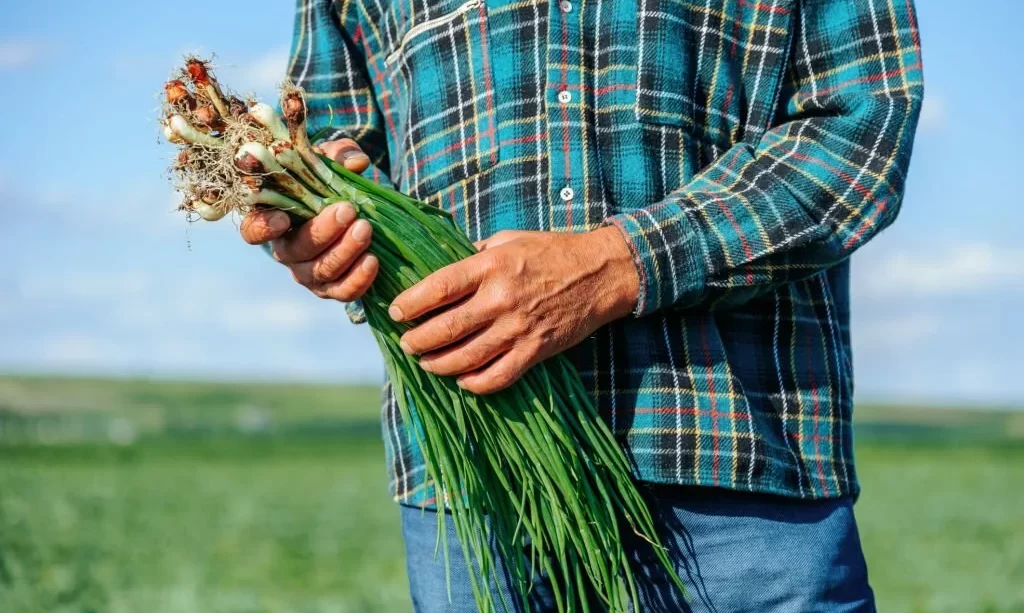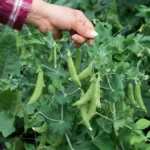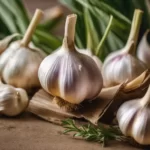Bunching onions, also known as green onions, spring onions, or scallions, are a kitchen staple that adds a burst of fresh flavor and a touch of vibrant green to countless dishes. Their versatility and delightful taste make them a popular ingredient in various culinary traditions around the world. In this exploration of bunching onions, we’ll delve into what they are, their distinct characteristics, and their role in the culinary world. From Asian stir-fries to Mexican salsas and beyond, these delightful green shoots are an essential part of many recipes.
What Are Bunching Onions?
Bunching onions, scientifically known as Allium fistulosum, are a type of onion that is harvested for their long, slender green stalks and small, white, or pale bulbous roots. Unlike common bulb onions, bunching onions are typically grown for their foliage rather than their bulbs, which remain small and do not develop into a full onion. This results in a milder and sweeter flavor, making them an ideal choice for raw or lightly cooked preparations.
The distinguishing feature of bunching onions is their lack of a well-defined bulb, and they form clumps of thin, hollow, and dark green leaves. These leaves can be sliced and used in a variety of dishes, providing a mild onion flavor with a hint of freshness. Bunching onions are known for their crisp texture, and they are often enjoyed for their ability to add a refreshing crunch to salads, garnishes, and cooked dishes.
Culinary Uses
Bunching onions are a versatile and essential ingredient in many cuisines. They bring a mild onion flavor to a wide array of dishes without overpowering the other ingredients. Some common culinary uses include:
- Garnish: Chopped bunching onions make an excellent garnish for soups, salads, and a variety of hot and cold dishes. Their vibrant green color adds visual appeal to the presentation.
- Stir-Fries: In Asian cuisines, bunching onions are a staple in stir-fry dishes. They are added towards the end of cooking to maintain their crispness and impart a fresh onion flavor to the dish.
- Salsas and Dips: Bunching onions are often featured in salsas, guacamole, and various dips. Their mildness complements the flavors of tomatoes, peppers, and other ingredients.
- Omelets and Scrambles: Bunching onions can be sautéed with eggs to enhance the flavor and provide a delightful texture to omelets and scrambled eggs.
- Salads: Sliced bunching onions can be used in salads to add a mild onion kick. They work well in green salads, potato salads, and coleslaw.
- Garnish for Meat and Seafood: Bunching onions can be used as a garnish for grilled meats, seafood, and other protein dishes, providing a fresh contrast to the richness of the main ingredient.
These are just a few examples of the many culinary uses of bunching onions. Their mild yet distinct flavor and crisp texture make them a go-to ingredient for enhancing the taste and appearance of a wide range of dishes.
Growing Bunching Onions
Growing bunching onions is a rewarding and relatively straightforward endeavor, making them an ideal addition to home gardens or container gardens. Here are some essential tips for cultivating these versatile green onions:
- Choose a Suitable Location: Bunching onions thrive in well-drained soil with plenty of sunlight. Select a location in your garden or a sunny spot on your balcony or patio for container gardening.
- Planting: Bunching onions can be grown from seeds or transplants. Plant the seeds or transplants in rows, spacing them a few inches apart to allow room for growth. It’s advisable to plant in successive batches to enjoy a continuous harvest.
- Soil Preparation: Ensure the soil is well-drained and enriched with organic matter. Bunching onions prefer slightly acidic to neutral soil conditions. Ample compost or well-rotted manure can help improve soil quality.
- Watering: Keep the soil consistently moist but not waterlogged. Bunching onions prefer even moisture to thrive.
- Fertilization: Fertilize with a balanced, all-purpose fertilizer during the growing season. An application at planting and another mid-season can provide the necessary nutrients.
- Thinning: If your bunching onions grow too closely together, consider thinning them to ensure adequate space for each plant to develop fully.
- Harvesting: Bunching onions can be harvested once they have reached the desired size, typically when the green tops are around 6-8 inches long. You can harvest them individually by pulling them from the soil or snip the tops with scissors, allowing the remaining plants to continue growing.
Varieties of Bunching Onions
There is a diversity of bunching onion varieties to choose from, each with its unique characteristics and flavors. Some popular varieties include:
- Evergreen Bunching Onions: Known for their dark green, long, and slender stalks, these onions are a classic choice for salads, garnishes, and stir-fries. They have a mild, sweet flavor.
- Tokyo Long White: These bunching onions are prized for their long white stems and a mild, slightly sweet flavor. They are ideal for Asian dishes and can be grown year-round in mild climates.
- Red Bunching Onions: As the name suggests, these onions have attractive red stems and a milder flavor than common red onions. They add a pop of color to salads and various dishes.
- Welsh Onions: These bunching onions have a more substantial bulb and milder flavor. They are excellent for both fresh and cooked preparations.
- Ishikura Improved: This variety produces long, tender, and tasty green stalks. It’s a consistent performer and a popular choice for gardeners.
When choosing a variety, consider your culinary preferences and local climate, as some types may be better suited to specific growing conditions. Regardless of the variety you select, bunching onions are relatively easy to grow and provide a fresh and flavorful addition to your homegrown produce.
Health Benefits
Beyond their delightful flavor and culinary versatility, bunching onions offer several health benefits. These green alliums are low in calories and rich in essential nutrients. They provide vitamin C, which supports the immune system, as well as vitamin K for bone health. Bunching onions also offer a range of antioxidants, including quercetin, which has anti-inflammatory properties.
Additionally, they contain folate, which is essential for cell division and may help prevent certain birth defects during pregnancy. The sulfur compounds in bunching onions have potential health benefits, such as supporting heart health and aiding in the detoxification process. Incorporating bunching onions into your diet can be a flavorful way to enjoy these health advantages.
Frequently Asked Questions
Can I grow bunching onions in a pot on my balcony?
Yes, you can grow bunching onions in containers on your balcony or patio. Make sure the pot has good drainage, and they receive adequate sunlight.
How do I store bunching onions?
To keep them fresh, store bunching onions in the refrigerator. Place them in a perforated plastic bag to maintain their crispness.
Can I use the white and green parts of bunching onions interchangeably in recipes?
Yes, you can use both the white and green parts in many recipes. The white part is milder, while the green part has a slightly stronger flavor.
Are bunching onions and chives the same thing?
While they are related, chives are a different species (Allium schoenoprasum) with a distinct flavor. Chives have a milder and more delicate onion taste.
Conclusion
Bunching onions, with their refreshing and mildly pungent flavor, are a culinary treasure. They enhance the taste and presentation of various dishes while providing a range of health benefits. Their versatility extends from salads to stir-fries, adding a delightful crunch and a burst of onion essence to every bite.
Whether you’re growing them in your garden or picking them up at the local market, bunching onions are a flavorful and nutritious addition to your meals. Their vibrant green tops and slender stems symbolize the essence of freshness in the kitchen. So, explore the world of bunching onions and savor the culinary pleasures and health benefits they offer.



